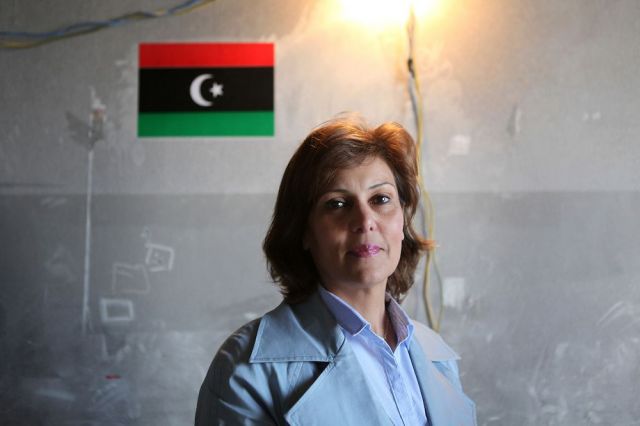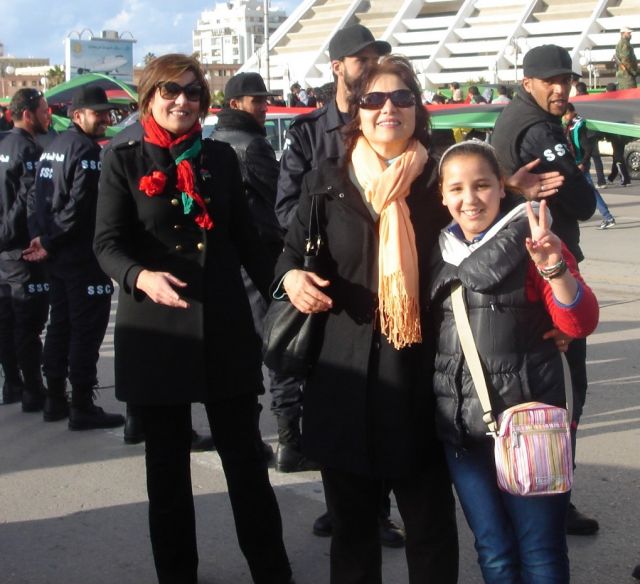Nada and her family
I’m from Benghazi?—?the largest city in the Cyrenaica region, Libya’s second largest city and the former joint capital of the country.
Libya is a North African country bordered by the Mediterranean Sea to the north, Egypt to the east, Sudan, Chad, and Niger to the south, and Algeria and Tunisia to the west. With an area of almost 1.8 million square kilometres, it is the 17th largest country in the world.
The capital, Tripoli, is home to two million of Libya’s six million people. Libya has the 10th largest proven oil reserves in the world. Persians, Egyptians, and Greek-Egyptians variously ruled the country before it became a part of the Roman Empire. Libya was an early centre of Christianity, but during the seventh century, Islam arrived with the Arabs. They merged with the local inhabitants and formed the modern Libyan population.
In 1969, Muammar El-Gaddafi became president and he remained in power for forty-two years?—?forty-two years of torture and autocracy. Any protest opposing his power quickly resulted in imprisonment or even execution. Once, in Abu Salim Prison, he killed 1200 political prisoners in cold blood in just two hours.
On February 15th, 2011, the security forces captured a lawyer and activist named Fathi Terbil. The people of Benghazi reacted with anger that lead to a protest. It began that evening with fifteen women, mothers, sisters, and daughters?—?relatives of prisoners from Abu Salim?—?demanding Fathi Terbil’s release. Although it was a strange sight to see women protesting since that goes against our tradition, more women joined. Although they were afraid, young men joined the women. Their future depended on it. Finally, the men came out?—?older men, men like my father, my uncle, and many others from around Benghazi. The protest grew and grew, until everyone was outside and screaming at the top of their lungs. It became like a walking wall that marched all the way to the city centre. Nothing could stop it.
The crowd continued to grow, and soon the police started firing water cannons and rubber bullets. Groups of protesters attacked the police with clubs and broken bottles. The next day, the demonstration grew more violent and the first mercenaries came to fight the protesters. Some appeared to be foreign workers, including Bangladeshis and Chinese. Many were not mercenaries at all, but men from southern Libya or African migrants in search of work. People said that they were promised payment by the government to fight us.
The first guns came on February 16th. The police attacked with high calibre weapons and tanks. Dozens of bodies were left on the ground, blood spilling down the pavement. The number of funeral tents grew and grew. And then Gaddafi started to bomb. This caused more anguish and anger. Men and young teenagers were collecting all of the knives and weapons that they could and going off to fight on the front lines. My oldest cousin, my aunt’s oldest son, was out there, along with many of his own cousins from his father’s side and lots of his friends. Many men died, ripping families apart, forcing them to flee to other countries for safety.
Months later, after all of the cities of Libya had been freed, Gaddafi fled to his hometown of Sirte. He was found in an old sewage pipe within hours. The locals brought him into the town square, and started to beat him. At last, when Gaddafi was bruised and practically unrecognizable, a man came up with his gun, and shouted, “For Libya!” as he shot Gaddafi in the head.
There were many people working in the courthouse at that time?—?some were actual lawyers and politicians, but many were just normal working people. They came to help build a system of laws, the courthouse, and the country all over again. My mother, Iman, was a local orthodontist, who taught in the Benghazi University. Along with my aunt, Salwa, she was also one of the first women to protest. My mother became the spokesperson for the Provisional Transitional National Council of Libya and my aunt was already a dedicated lawyer. They worked together and with others to erase the “Muammar” mentality in the people’s minds.
Despite threats on her life, my aunt, Salwa, returned to Benghazi to vote for a brighter Libya. Soon after she had posted a picture on Facebook showing her participation and urging others to do the same, she was shot in the head, assassinated in her own home.
On Wednesday, June 25th, 2014, at 10 PM, my father stumbled in with his shirt splattered in blood, Salwa’s blood. I heard my mother screaming and my father crying. My parents and I went to my grandmother’s house and we were met by thousands of angry and distraught women in front of the door. I was taken away from the commotion and left in my grandfather’s house alone and scared. I screamed for what seemed like a long time and then fell asleep hoping I’d wake up and that the whole incident was just a dream. It wasn’t.
After my aunt’s death, the whole country mourned for her. The Guardian stated that “the US ambassador to Libya, Deborah Jones called the news ‘heart breaking’, and on her Twitter account denounced ‘a cowardly, despicable, shameful act against a courageous woman and true Libyan patriot.” That was nearly a year ago, a day I will never forget.
I was sent to stay with a friend’s family and then to my grandmothers when my friend’s family left Libya for good. On my way to my grandmother’s, I was taken back to go say goodbye to my auntie. My mother walked me into the funeral salon. As I approached her open coffin, despite the violence of her death, I saw her beautiful face for the last time. I want you know that my aunt Salwa was perfect, even in death, despite it all. I kissed her head and read her a verse of the Quran. The image of her face that day still awakens me and saves me from the nightmares. I can’t get it out of my mind.
Funerals were held for my aunt across Libya and the globe, from the USA to England and Jordan to Dubai.
She had a voice; she was like a haven, a beacon, and she always sought to tell the people of my country right from wrong. People looked up to her, and they respected her, and saw her as a candle in the wind. That is why I am here, in Jordan; I’m here for my safety, and my family’s.

Nada’s aunt, Salwa
Nada is a 14-year-old Libyan refugee and niece of prominent human rights attorney Salwa Bughaighis who was assassinated last year by masked gunmen in her home in Benghazi. Nada will be part of a special event documentary series entitled The Trials of Spring, which focuses on the role of women in the Arab Spring uprisings and its aftermath. Nada is featured in Wake Up, Benghazi!, one of the short docs in the series about the life and death of her aunt.
There will be a screening of The Trials of Spring in Los Angeles on September 20th and in San Francisco on September 21. Visit this website for more information: http://www.trialsofspring.com/screenings
This post originally appeared on Medium.
Read more on Bust.com:
Egyptian Man Dresses Like A Woman, Gets Harassed Like A Woman
The Feminism Of Violent Protest: Egypt Edition


